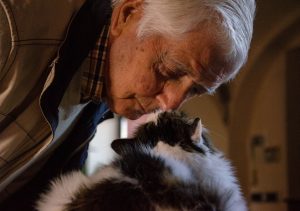Strategies for Supporting Older Adults Experiencing Loss
In this two-part blog post, we began by exploring what factors can influence how seniors experience pet loss relative to other groups of people. This week, we end by outlining ways to support them in light of these differences. Click here to read the first post in this series.
Given the elements that can set them apart, how can we support the older adults in our lives when they are experiencing a loss? This can feel like an overwhelming question. However, the key is to take the steps you can, no matter how small. Here are some suggestions for where to start:
Check in with them via regularly. A phone conversation (or, during COVID-19, a masked and socially distanced outdoor visit) can be a bright spot in someone else’s day even if it lasts just 10-15 minutes. You can talk about whatever you like – how your day has gone, TV shows you’ve been catching up on, books that you’re reading … the sky is the limit. They may want to talk about their pet or their grief, but even if they aren’t ready to, a casual conversation about other light-hearted events may be a welcome distraction.
It can be especially nice to consult with an older friend about an area where they have some wisdom and expertise. For example, perhaps your neighbor has made her own bread for years and you are trying to figure out where to begin with your sourdough starter!
Know that check-ins do not need to even be as involved as a phone call or visit, if something shorter fits better. Perhaps you agree to knock on your friend’s living room window each morning when you take your dog out to use the bathroom, and they’ll wave at you if they are doing OK.
Offer support where they would like it.
Emotional support. Loss can be incredibly isolating, especially in older age, when people are more likely to experience multiple losses in a shorter period of time. Feel free to ask the person how they are doing and to invite them to talk about their grief with you. It can be healing for people to talk about the memories they have of those they have lost.
Task support. While some people may take you up on your offer to discuss their loss, others may not be as comfortable discussing their feelings or their grieving process. As a result, it can be helpful to also offer a concrete, specific way that you can help. For example, perhaps you can make an extra dinner portion every Friday night and drop it off for your neighbor. Maybe you can make sure their walkways are shoveled when it snows. Or perhaps you can make sure their mail and newspaper are tucked safely into their doorway each morning.
Know who in their personal life to reach out to if they may need help. Does your older family member or neighbor have an aide who visits every day, or an adult daughter who comes over to help out a few times a week? If your friend is comfortable, ask if they can share that person’s contact information with you so that you can be a part of their safety net.
Have information for local support agencies on hand if your friend would like to explore ways that they can get more assistance at home.
- The Senior Linkage Line 800-333-2433 can help you gather info on local services supporting older adults in your area (for example, questions about Medicare coverage, homemaking and caregiving services, and meal delivery).
- Help Older Adults MN (https://helpolderadultsmn.org/) has a searchable online listing of services during COVID, such as grocery delivery, medicine delivery, tax assistance, and wellness check-ins.
- Little Brothers Friends of the Elderly is running a phone companion program where adults ages 65+ can start and build a relationship with a volunteer that will reach out and call them regularly. You can visit https://www.littlebrothersmn.org/phone-companions/ to register online; email [email protected] to register by email, or call 612-746-0737 to register by phone
Remember that every small gesture helps. Acts that may feel insignificant to you can make a considerable difference in another person’s life.
“Grief releases love and it also instills a profound sense of connection.” – Jacqueline Novogratz

